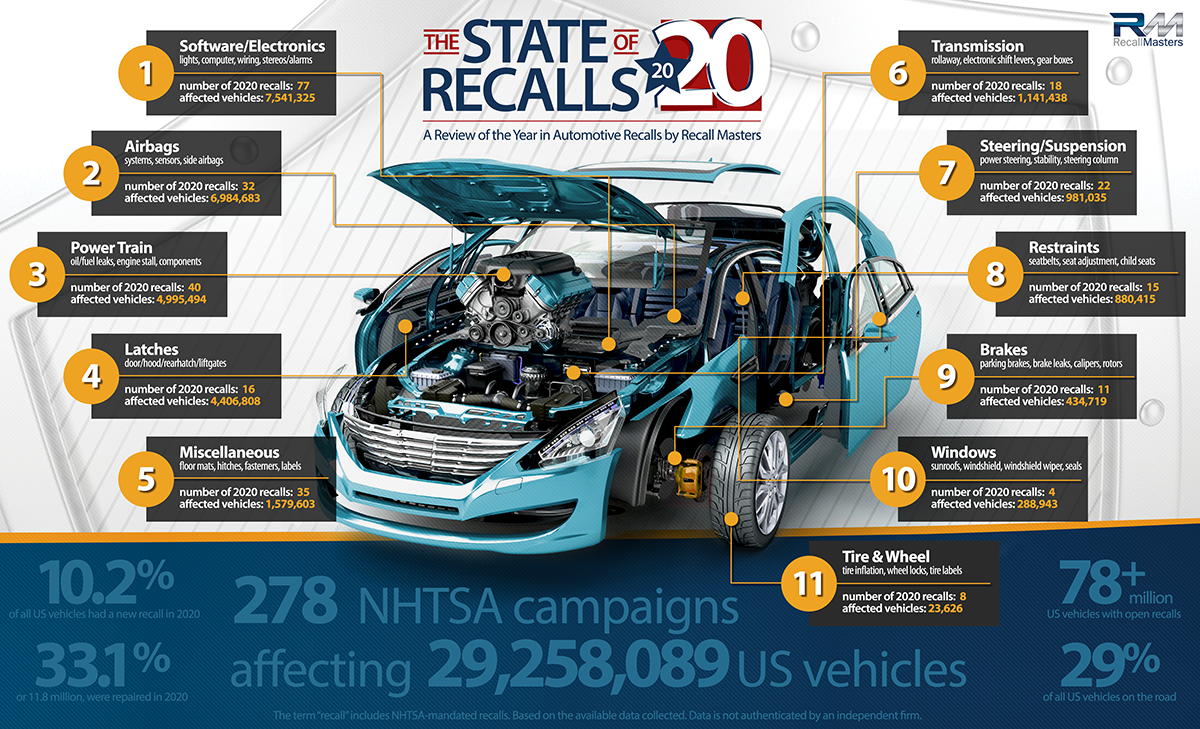Recap of 2020 Recalls Reveals Impact of Pandemic on Compliance and the Continuing Threat
Recap of 2020 Recalls Reveals Impact of Pandemic on Compliance and the Continuing Threat
Despite a depressed manufacturing schedule due to the pandemic, 2020 NHTSA-mandated and OEM Voluntary recalls remained stead, adding to the enormity of the recall crisis
Laguna Hills, CA, May 12, 2020 — In its fourth “State of Recalls” report, Recall Masters, Inc., the automotive industry’s leading provider of recall solutions, revealed that more than 29.3 million affected vehicles were accounted for in 278 recalls mandated by the National Highway Traffic Safety Administration (NHTSA) in calendar year 2020. Another estimated 266 “voluntary manufacturer notice” campaigns affected the passenger cars and light trucks framed in this report. While many vehicles have more than one defect present, the 2020 total of 83.2 million affected vehicle recalls translates to more than one in four vehicles on US roads with at least one open recall. With an estimated 286.9 million registered vehicles in the country, the threat to drivers and passengers is greater than ever.
In a year littered with fallout from the COVID-19 pandemic, automotive manufacturers fell far below annual production estimates. Throughout the United States, new vehicles are a scarce commodity on dealership lots due to a worldwide shortage of semiconductors. The pandemic caused the closure many of the few factories that produce these processors, bringing the OEMs to a grinding halt on new vehicle production. Those computer chips have become vital components in vehicle operation, as cars become more like computers than machines. Limited silicon chip production now forces OEMs to compete with other industries that build more in-demand products such as ventilators, computers and mobile phones. The shortage of new cars has driven up prices for pre-owned vehicles, which were already in demand prior to the pandemic. Newer pre-owned vehicle costs limit available profit for dealers, who now turn to older vehicles – 29% of which have a dangerous an unrepaired recall. New vehicle availability might not return to pre-pandemic rates until late 2021.
“While used cars with an open recall are sold at a record pace, recalls are an even bigger threat to consumer safety,” explains Sean Reyes, Chief Marketing Officer at Recall Masters. “In the face of falling sales revenues, franchise dealers turned to fixed operations to close the gap, repairing almost three times more same-year recalls as in prior years. Unfortunately, this recall compliance data can’t negate the annual growth rate. We’re just piling unrepaired recalls on top of previous years’ unrepaired recalls, but with the additional risk of used cars that are not exiting the market. Prior to the pandemic, many of these vehicles would be scrapped. Now, with limited availability of new cars and newer pre-owned vehicles, consumers are repairing these older vehicles at independent shops where recall repairs cannot be performed.”
Automotive recalls drew concern from consumer groups and legislators in recent years after dangerous Takata airbags caused several deaths and injuries. The Takata airbag problem lingers menacingly for 2020, as 32 airbag recall reports affecting almost 7 million total vehicle recalls keeps close pace with previous reported campaigns. Many of these faulty airbags were installed amidst a parts shortage, knowing that they would eventually have to be replaced. Software and electronics recalls led both total campaigns (77) and total vehicles affected (7,541,325). Vehicle features such as lane correction, auto-braking, in-cabin electronics, auto-parking and other driver-assist functions are heavily dependent on electronic components and software. These electronic components are usually encased in plastic and are more susceptible to environmental and driving conditions. Much like your laptop or phone, software requires patch updates. The increase in the Software and Electronics category is causing Service Directors to redesign their service bays for a wave of high-tech recalls. The 2020 State of Recalls Report also breaks down recalls by OEM and provides additional analysis like risk to consumers, vehicle system defect source, and vehicles counts for each defect category.
“This report takes a much deeper look at vehicle defects that include NHTSA-mandated recalls and a variety of other factory notices,” describes Reyes. “While this is the most comprehensive report of its kind, we acknowledge the gaps in data that come from how factory notices and collected, tabulated and scored. The automotive industry, consumer safety groups, legislators and consumers look to Recall Masters to provide them with a better understanding of vehicle defects and how to solve the recall crisis, which means more data than what the government currently provides. These voluntary manufacturer notices are not regulated and can range from typographical errors in the owner’s manual to defects that are on their way to becoming NHTSA-mandated recalls. We would all benefit from centralizing that data so that reporting can be more accurate. It’s going to take a collective effort, but we’ll get there in time.”
To date, the State of Recalls is the only annual report to publish voluntary manufacturer notices. Many in the automotive industry and consumer safety groups incorrectly assume these notices do not pose risk to consumers, like those recalls mandated by NHTSA. However, the gaps in time between reporting a defect and the investigations that follow, can leave vehicle owners vulnerable. Recall Masters tracks a vast number of these notices, providing risk scoring for the industry and consumers, along with other data points that can help dealerships appraise off-brand vehicles they might acquire at trade-in or at auction.
“We believe the consumer needs to know.…and dealerships need to know,” notes Reyes. “One of the leading reasons recalled vehicles go unrepaired is because owners and off-brand franchise dealerships don’t know about the recall. We’re changing that, not only with data and solutions for consumers, dealerships and the auto industry, but with the concept that we’re all in this together. This report is part of the process – complete transparency. Our industry is very committed to safer cars. Having access to data and technology are essential parts to making that possible. We’re pleased to be making a difference.”
# # # # #
About Recall Masters: Recall Masters is the leading provider of automotive recall news, data, training, and communications. The company is dedicated to helping automakers and their dealers expedite the repair of recalled vehicles and make the roadways safer for everyone. Greater recall awareness and proactive recall management helps automakers protect their brand and build trusting relationships between automotive dealers, rental car agencies, auto auctions and consumers alike. Recall Masters is a privately-held company based in Laguna Hills, CA. For more information, please visit www.recallmasters.com.
Media Inquiries
Sean Reyes
Chief Marketing Officer
949.246.6023
sean@recallmasters.com
For the purposes of this document, the term “recall” includes NHTSA-mandated recalls and an unaudited list of TSBs, defects and any other voluntary manufacturer notices that are issued by the manufacturer as part of an effort to inform consumers, dealerships and other entities that may own the affected vehicle. The use of the word “recall” should not be interpreted as a formal notice of a recall, either from the manufacturer or NHTSA. This summary is based on the available data collected by Recall Masters and is not a thorough accounting of all affected vehicles for 2020. Data is not authenticated by an independent firm.


